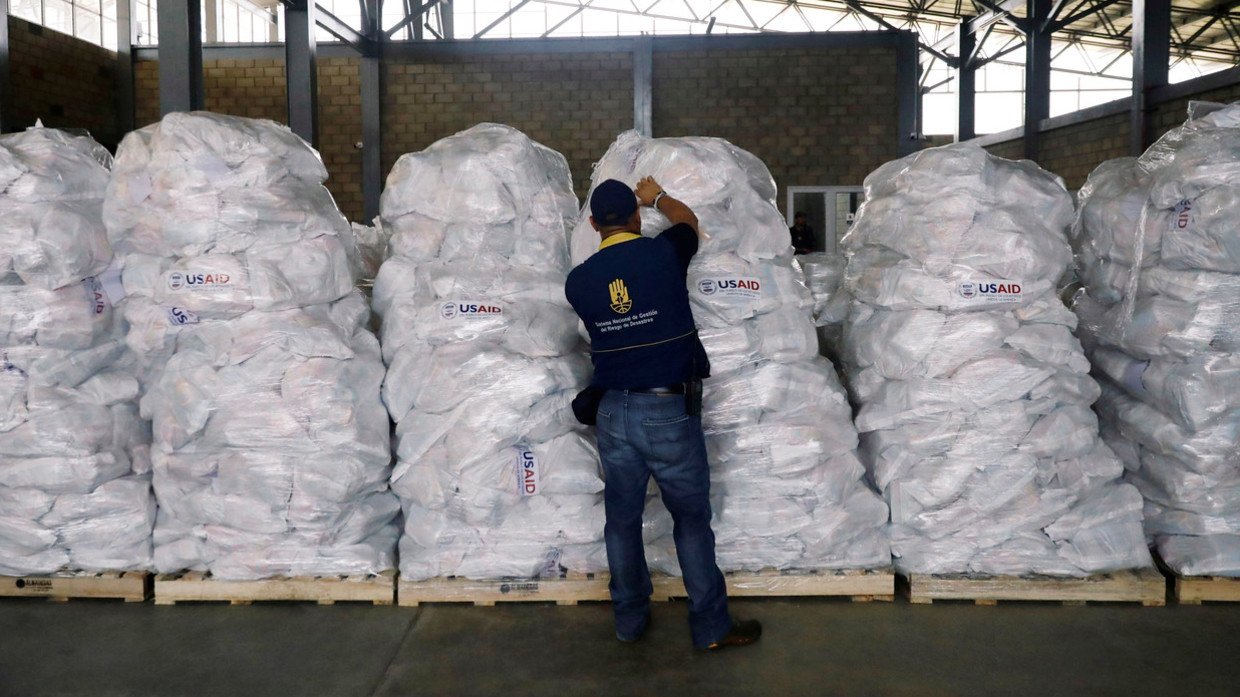Waving both the carrot and the stick at Venezuelan President Nicolas Maduro, Washington hit Caracas with fresh sanctions and said it will use the military to send humanitarian aid to the crisis-stricken country.
The sanctions add to a growing pile of financial penalties the US has applied to Maduro’s government in recent weeks. They target the country’s state-owned oil company PDVSA, and five officials "in charge of Maduro's security and intelligence apparatus, which has systematically violated human rights and suppressed democracy, including through torture and other brutal use of force,” in the words of Treasury Secretary Steven Mnuchin.
Also on rt.com Maduro wants troops at border with Colombia against US 'provocation'While squeezing the country’s beleaguered economy with the intention to oust Maduro, the Trump administration is offering aid to those Venezuelans willing to back its handpicked “president” Juan Guaido. On Saturday, the US military will fly 250 tons of humanitarian aid to the Colombian town of Cucuta, on the border with Venezuela, according to a State Department email seen by the Associated Press.
On Friday, US Secretary of State Mike Pompeo said that “massive humanitarian assistance” would be on its way to the region this weekend. While US military aircraft will be used, a Pentagon official told the Washington Post that these planes will deliver the supplies of food, medicine and hygiene products, before returning to the US.
Some USAID shipments have already arrived in Colombia, where they sit waiting for refugees who cross the border from Venezuela. These shipments, however, were delivered by civilian planes.
Getting the deliveries into Venezuela is a different story. Maduro has already rejected American aid, denouncing the shipments as “crumbs” and pretext for an invasion. US National Security Adviser John Bolton no doubt helped stoke these fears with his not-so-subtle hint that the US might send“5,000 troops to Colombia.”
Critics of the Trump administration’s push for regime change in Caracas have also pointed out that Elliott Abrams – the State Department’s recently appointed special envoy for Venezuela – ordered the delivery of weapons to US-backed rebels in Nicaragua under the guise of “humanitarian aid” back in 1986.
Despite declaring himself interim president last month and being recognized by the US, Guaido ultimately has no say over whether the aid is allowed in. Nevertheless, he told supporters at a rally on Wednesday that he would ensure the supplies get in by next weekend, and “ordered” Venezuela’s armed forces to let them in.
Steve Olive, acting USAID assistant administrator for the region, told a Congressional hearing on Wednesday that his team is in contact with Guaido to figure out a way of getting the shipments across the border. When asked whether aid could be moved in by boat, Olive did not directly answer the question, but said USAID is “looking at scenarios of flying things in as the situation permits.”
Slipping supplies into Venezuela, whether by plane or boat, would be another step towards overt US intervention in Guaido and Maduro’s power struggle. President Trump has repeatedly stated that military action in Venezuela is “on the table,” and the use of military aircraft to deliver the latest aid haul underscores this threat. Democrats in US Congress, however, denounced the threat of intervention as unacceptable.
Also on rt.com US Venezuela envoy confronted by RT America correspondent over past war crimes (VIDEO)Maduro has condemned the US recognition of Guaido as a “vile” coup attempt, and has vowed to bog the United States in a bloody, Vietnam-style conflict should Trump attempt an invasion. Despite the fighting talk, Maduro has reportedly invited Abrams to meet for talks. The Venezuelan leader also said he had sent his foreign minister to meet with Abrams in New York twice already.
The conciliatory tone seems to be doing little for Maduro, however, as Pompeo argued on Friday that it was proof of his "increasing understanding that the Venezuelan people are rejecting him."
Think your friends would be interested? Share this story!

